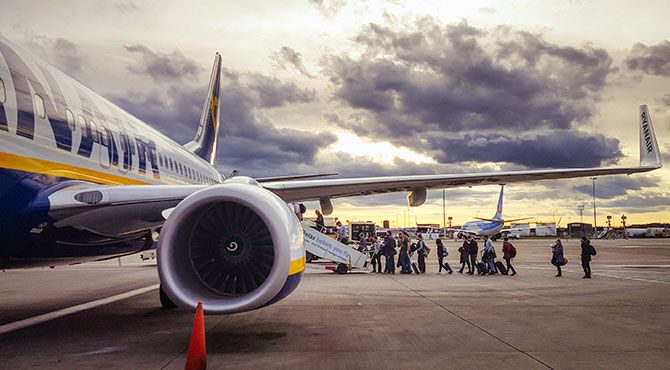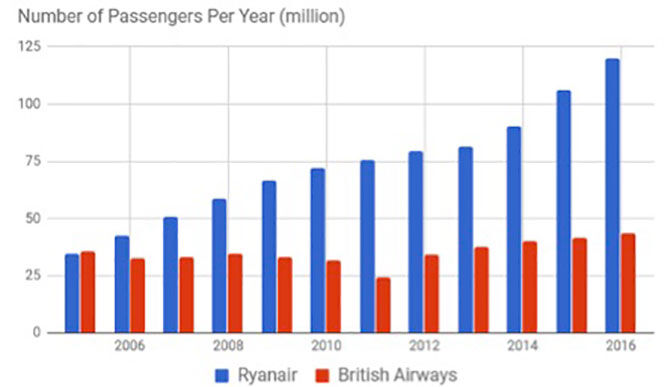Mobility industry ‘can take lessons from low cost airlines’
What can the global mobility industry do to push forward into the future? Nitzan Yudan, CEO of Benivo suggests relocation providers should learn from the low cost airline (LCA) revolution.

Lesson one: Lower costs means higher usage
Low cost airlines enabled more people to travel than ever before. The additional capacity and affordable seats they provide didn’t replace first class or business cabins, they added an alternative. This resulted in more people flying more frequently.In the US, when Southwest Airlines launched, passenger traffic grew by 85 per cent in just one year. These were all people who wanted to fly but couldn’t afford it before the low cost solution was introduced.Similarly, in Europe, Ryanair has far outpaced its main legacy rival, British Airways, in both growth and absolute numbers.
What can global mobility providers learn from this?
Recent research conducted by Benivo shows that up to 50 per cent of moves within a company are not supported by global mobility, because the costs of delivering traditional relocation support are too high. We call these employees the ‘out-of-policy moves’, and their numbers are growing by the day. Even when you just consider new hires, there is a large population of unsupported talent – 20 per cent of new hires need to relocate for work, but the majority of them are not supported for budget reasons. Globally, that’s 50 million employees per year.The conclusion is clear; lower cost relocation solutions will enable employers to support more of their staff, and will result in more moves, as well as acquisition and retention of better talent.Lesson two: Rethinking the mobility business model
When low cost airlines began challenging the traditional model, they took a new approach. They started with a clean slate and simply asked: What is the bare minimum needed for someone who is flying? The answer: to get from point a to point b safely. All the rest is optional.By focusing on the core needs and rethinking the business model, a number of opportunities emerged:- Elimination of unpaid extras: Passengers were paying an average price in order to cover the costs of all extras, but not everyone used all services. Eliminating the included glass of champagne reduced cost, and pricing transparency increased trust
- Reduction of complexity: Using only one aircraft type (compared with up to 20 for some legacy airlines) reduced maintenance and training cost
The lesson for Global Mobility
Traditional relocation services are delivered with a hand-holding, one-to-one approach. That’s not only expensive to deliver, but also irrelevant to the needs of a growing number of employees. They might not have a family yet, or entire households to ship, and often don’t need to spend time with a relocation specialist.Hence, the traditional market offering does not cater well to the needs of a growing employee segment. On the other hand, merely providing an amount of money with no accompanying support service is a poor employee experience.Technology can change this. New business models can challenge this. For example, using scalable tools that provide all the information employees need (for example, wiki documents, discussion groups and ad-hoc mentoring), as well as a do-it-yourself mentality – all this gets the customer from a to b, all the while cutting out the metaphorical glass of champagne.Lesson three: Low cost doesn’t have to mean a poor experience
Academics at the University of Missouri researched whether Low Cost Airlines or Legacy airlines delivered a better passenger experience. The study collected five years’ worth of data and identified four key factors: On-time arrival, passengers denied boarding, mishandled baggage and customer complaints.The results were clear – low cost airlines deliver a better customer experience.Southwest Airlines (SWA), an LCA, were ranked as the top customer experience airline in the 2017 Temkin Experience Ranking. SWA focus on the core values to the passengers (on the four key factors mentioned above), and provide an experience by empowering their employees. The popular videos of Southwest Airlines flight attendants demonstrating their personal skills and personality have gone viral and did their bit to promote the company without Southwest Airlines spending a single extra dollar.It’s possible to deliver a better experience at a lower cost by understanding your customers and what they care about most. At Benivo, we see a 50 per cent improvement in our clients’ employees’ experience and employer brand appreciation by providing a better experience for their mobile talent, all without breaking the budget.Lesson four: Focus is the key
When it comes to low cost, to be the best requires specialisation. It can’t be just one more service provided by a company, it requires a completely new approach to business. It requires a dedicated DNA that does not seek to maximize profits by increasing prices, but instead maximizes efficiency, improves the customer experience, and reduces prices.The 13 legacy airlines below have launched a low cost subsidiary (which includes a British Airways service). None of which survived:
Why this should matter to relocation providers
Comprehensive, end-to-end relocation support is traditionally reserved for senior employees, catered to by professional relocation service companies.Early career and mid-level employees usually don’t receive structured support, but rather a small extra payment for relocation expenses and temporary accommodation. Our research suggests that often, this leaves employees in a state of confusion and uncertainty, and that the stress of the relocation often translates into a negative employer brand experience.Talent acquisition and retention are top concerns for CEOs. Removing relocation stress for entry-level employees can be hugely beneficial for companies who want to acquire and retain the best talent.Four lessons for the mobility industry
Four important lessons, four opportunities to deliver a better experience to more relocating employees at a lower price. What do you think would happen to the number of relocations and to the company’s employer brand if they supported 100 per cent of the moves in the organization instead of just 50 per cent? Can you afford to have your competitor doing it?Care to learn more about welcoming early career employees? Download our eBook, The Art and Science of an Outstanding Company Welcome.Nitzan YudanNitzan Yudan started Benivo in 2011 during his MBA at London Business School. Having worked in technology throughout his career, Nitzan is a strong promoter of equal opportunities, and is a popular speaker at business schools. As a nominee for the Rising Star in Global Mobility Award by FEM, Nitzan recently spoke at the Houses of Parliament about the importance of welcoming employees.Nitzan is an avid traveler and backpacked for over 2 years on 5 continents.BenivoBenivo is the leading technology solution to deliver relocation on a budget to junior employees.Benivo helps employers make every employee feel welcome, without breaking the budget. Benivo helps employers improve the employee experience of their mobile talent by 50%, counting Google, Microsoft, Vodafone, and Bloomberg among its numerous clients.Founded by Nitzan Yudan in 2011 as FlatClub, Benivo operates from two offices in London and Yerevan (Armenia). The company has won numerous prizes and competitions, raised seed and growth funding, and was featured in the Financial Times, Forbes, and TechCrunch.For related news and features, visit our Mobility Industry section.Relocate’s new Global Mobility Toolkit provides free information, practical advice and support for HR, global mobility managers and global teams operating overseas. Access hundreds of global services and suppliers in our Online Directory
Access hundreds of global services and suppliers in our Online Directory
©2025 Re:locate magazine, published by Profile Locations, Spray Hill, Hastings Road, Lamberhurst, Kent TN3 8JB. All rights reserved. This publication (or any part thereof) may not be reproduced in any form without the prior written permission of Profile Locations. Profile Locations accepts no liability for the accuracy of the contents or any opinions expressed herein.






































